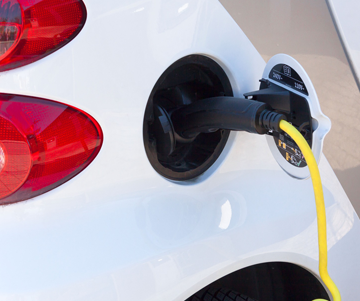Electric vehicles are a smart transportation choice.
Electric Vehicles (EV) Cost Less to Operate than Gas Powered Cars.
Depending on your local gasoline and electric rates, EV operation can be 3 to 5 times cheaper than gasoline and diesel powered cars.
Never Go to the Gas Station Again.
Electric vehicles do not require gasoline and can be charged at home with a standard 120V outlet or a 240V level 2 charger can be installed for faster, more efficient charging.
EVs are Environmentally Friendly.
EVs have no tailpipe emissions. The power plant producing your electricity may produce emissions, but electricity from hydro, solar, nuclear, or wind-powered plants is generally emission-free.
EV Performance Benefits.
Electric motors provide quiet, smooth operation, stronger acceleration and require less maintenance than gasoline-powered internal combustion engines.
EV Driving Range & Recharge Time.
EV range is typically around 80 to over 330 miles on a full charge. The average American’s daily round-trip commute is less than 30 miles. Fully recharging the battery pack can take 4 to 8 hours. A "fast charge" to 80% capacity can take 30 min.*
*Source: U.S. Department of Energy
Depending on your local gasoline and electric rates, EV operation can be 3 to 5 times cheaper than gasoline and diesel powered cars.
Never Go to the Gas Station Again.
Electric vehicles do not require gasoline and can be charged at home with a standard 120V outlet or a 240V level 2 charger can be installed for faster, more efficient charging.
EVs are Environmentally Friendly.
EVs have no tailpipe emissions. The power plant producing your electricity may produce emissions, but electricity from hydro, solar, nuclear, or wind-powered plants is generally emission-free.
EV Performance Benefits.
Electric motors provide quiet, smooth operation, stronger acceleration and require less maintenance than gasoline-powered internal combustion engines.
EV Driving Range & Recharge Time.
EV range is typically around 80 to over 330 miles on a full charge. The average American’s daily round-trip commute is less than 30 miles. Fully recharging the battery pack can take 4 to 8 hours. A "fast charge" to 80% capacity can take 30 min.*
*Source: U.S. Department of Energy

Choose EV
This website is designed to provide you with information about electric vehicles and to help shape a healthy electric vehicle marketplace. The Northwest is an ideal place to own an EV as much of our power comes from hydroelectric and renewable energy sources. That means that when you drive an EV you are trading your fossil fuels (gasoline and diesel) for energy coming from dams, wind farms and in many cases solar power. While some of the electricity in the NW comes from coal and natural gas burning power plants and nuclear facilities, when you choose EV, you're likely using less fossil fuel than a traditional gas powered car.
Unlike gasoline-powered vehicles, electric cars emit no tailpipe pollutants. All-electric vehicles require very little maintenance, saving consumers money over the life of the car. Even the brake pads last longer in electric vehicles because they use regenerative braking to slow down, a method of converting the energy used to reduce the car’s speed into power that is stored in the car’s battery. With many electric vehicles having a range of 100 to 300+ miles per charge, they are a reliable and comfortable way to get from point A to point B.
This website is designed to provide you with information about electric vehicles and to help shape a healthy electric vehicle marketplace. The Northwest is an ideal place to own an EV as much of our power comes from hydroelectric and renewable energy sources. That means that when you drive an EV you are trading your fossil fuels (gasoline and diesel) for energy coming from dams, wind farms and in many cases solar power. While some of the electricity in the NW comes from coal and natural gas burning power plants and nuclear facilities, when you choose EV, you're likely using less fossil fuel than a traditional gas powered car.
Unlike gasoline-powered vehicles, electric cars emit no tailpipe pollutants. All-electric vehicles require very little maintenance, saving consumers money over the life of the car. Even the brake pads last longer in electric vehicles because they use regenerative braking to slow down, a method of converting the energy used to reduce the car’s speed into power that is stored in the car’s battery. With many electric vehicles having a range of 100 to 300+ miles per charge, they are a reliable and comfortable way to get from point A to point B.
